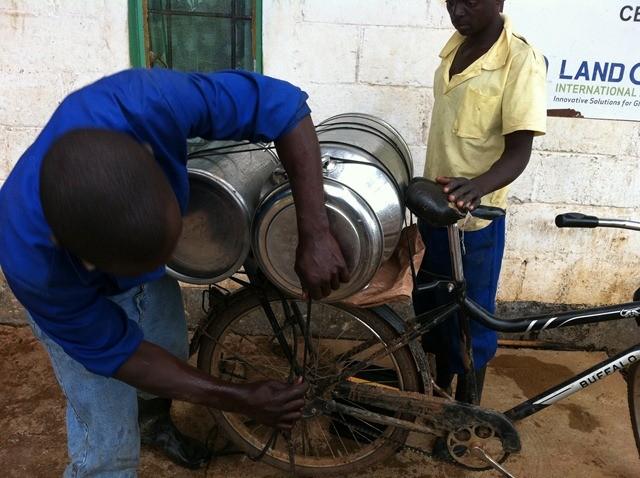
By Erika Herz
Societal issues loom large, and MBA students don’t want to wait until the end of their programs to make a difference.
As Prof. Andrea Larson of the University of Virginia Darden School of Business shared in her October Triple Pundit article, students eagerly refine their abilities to lead in business with an eye toward sustainable innovation and social impact. An instrumental and increasingly popular means for doing so is global experiential learning. Working beyond domestic sustainability challenges gives these students the opportunity to tackle very complex business, political and cultural situations – all in one project.
Global company visits have long been prevalent as for-credit business school classes, offering plenty of opportunities for students to see firsthand the leadership challenges (and opportunities) they will encounter when working among those from different cultures. For learning on sustainability topics, these classes can be even more beneficial when a team of students completes an actual project for an organization involving a combination of preparatory classroom work and research in-country.
Several projects have been conducted at Darden this academic year, including those with mature organizations as well as brand new ventures. All are overseen by the Darden Center for Global Initiatives, led by Executive Director Marc Johnson, which builds the connections between Darden and top executives, organizations and business schools around the globe.
Darden School alumni in more than 90 countries and relationships with 25 partner schools outside the U.S. help ensure a meaningful opportunity for students to grapple with environmental and social challenges in real-time -- in the context of an unfamiliar culture. These four examples show how global experiential learning is helping MBA students tackle tomorrow's environmental and social problems today.
1. World Bicycle Relief in Zambia
World Bicycle Relief (WBR) alleviates poverty by providing local citizens with bicycles that enable children to go to school, parents to access health care for their families, and entrepreneurs to bring products to market. [Listen to a Darden GreenPod interview with the COO here – scroll to #19.]What students seek to address
The number of individuals who can benefit from the bicycles WBR offers is outstripping the organization’s capacity, as it often participates in large-scale disaster-recovery efforts. Students must address:
- How can the organization solve complex business challenges related to its technical and supply chain capabilities?
- How can it increase available capital in order to serve more people?
2. INASante in Tunisia
INASante is a newly-founded social enterprise, aiming to be the first healthcare services accreditation agency in Tunisia, with the ultimate intention of serving a wider African market.
What students seek to address
- What type of business model is needed for this organization to generate the first quality management process in the country’s healthcare industry?
- How can it promote the adoption of, and adherence to, standards that ensure effective and equitable treatment access for Tunisians?
Working jointly with fellow MBA students at the Mediterranean School of Business, the team creates financial models for the enterprise, conducts market research and develops systems for measuring impact.
3. Freeset Global in India
Freeset Global in Kolkata, India manufactures custom bags, shirts and other garments. By providing jobs for the women it employs, Freeset addresses the growing problem of human trafficking -- freeing the women from forced participation in the sex trade and providing a better life for them and their children.What students seek to address
Students generate a detailed analysis of the current Freeset business strategy, customer base and marketing strategy, and they envision a large-scale growth strategy that will provide an increasing number of women the economic alternative to indentured servitude. This includes identifying product diversification/positioning opportunities, new distribution partners and a communications plan.
4. Rotary Club of Calapan City and Baruyan in the Philippines
Rotary Clubs bring together business and professional leaders to serve and build their communities around the world.
What students seek to address
Working with community leaders in a rural Philippine village, students address:
- What would characterize an innovative and sustainable economic development plan for the area?
- How can natural resources be protected and cultural traditions honored while addressing high unemployment and poverty?
What skills are gained, and what more is needed?
Classroom learning on sustainability topics is critical. But learning in the field while aiding a valuable organization helps students develop into sustainability-savvy leaders who can:
- Successfully align multiple business functions (such as product development and supply chain management) to achieve sustainability aims and find competitive advantage.
- Take a system-wide view of both company and industry, creatively and diplomatically influencing key individuals and groups across that system to effect change.
- Engage in solution design with a wide variety of stakeholders, including employees, customers, local governments, and nonprofit partners.
It is a Herculean task to bring together all the right players to enable these projects to be beneficial for all involved, as my colleagues in the Darden Center for Global Initiatives and our faculty will attest. However, it is critical for business schools like Darden to invest expertise in developing an increasing number of these opportunities for students. Simultaneously, the organizations themselves must carve out the bandwidth – even when running on a shoestring budget -- to work with MBAs passionate about using their business skills to address the world’s most serious issues. Ultimately we all benefit from helping to create more MBA change agents intent on improving society.
Images courtesy of the Darden School of Business
Erika Herz is Associate Director of Sustainability Programs for the Darden School of Business and Managing Director of the Alliance for Research on Corporate Sustainability (ARCS).
TriplePundit has published articles from over 1000 contributors. If you'd like to be a guest author, please get in touch!














